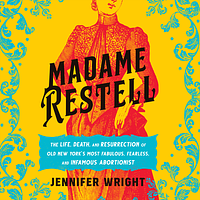You need to sign in or sign up before continuing.
Take a photo of a barcode or cover
emotional
funny
hopeful
informative
medium-paced
dark
emotional
funny
hopeful
informative
reflective
medium-paced
Petty. Stubborn. Opinionated. Outspoken. Madame Restell (Ann Trow Summers Lohman) was all of these things. But she was also courageous, smart, skilled, and stood firmly in her conviction that women have an absolute right to control their own bodies and the size of their families. Here's a woman who would have absolutely bought herself flowers. And this book is not just about her, but about a time and place, about shifting beliefs and social mores, and about abortion. 19th century New York City (and the USA) weren't as different from today as we'd like to believe, and the author tells this tale with humor, candidness, and no small amount of urgency.
slow-paced
"Madame Restell" by Jennifer Wright explores the life of Ann Trow Lohman, a controversial 19th-century abortionist known as Madame Restell, and also provides a rich historical account of the challenges and choices faced by women during that era.
In this book, the author not only presents a vivid portrait of Ann Trow Lohman but also talks about the tricky ethical and moral questions tied to her work as a midwife and abortion provider. The book makes us ponder the norms and biases of that era, offering a detailed look at how Madame Restell influenced women's reproductive rights. The prose is both informative and empathetic, making the reader empathize with the complexities of Madame Restell's life.
The author's detailed research and engaging storytelling make this biography an insightful and compelling read. I was hooked throughout the reading.
Some excerpts from the book:
By the mid-1800s, the streets of New York teemed with an estimated 30,000 homeless children. The miserable conditions they lived in were startling at best, but more often appalling. In 1849, the Brooklyn Daily Eagle begged people to look to Lower Manhattan, five minutes from the Fulton Ferry, where they’d see “ragged children crouched and huddled together like swine… greedily devouring the contents of their filthy baskets: all day long they have been wandering up and down the streets gathering half picked bones and rejected food; cast from the swill tub into the gutter.” The paper described a scene of “six wretched, starving, freezing children” huddling around their mother, who was “ragged and filthy in the extreme, her dress in rags and tatters, her hair is matted in wads, and she is, indeed, an object of loathing.
How close to death am I before somebody is going to take action and help me?
Tell the next generation that there was a time when we owned our bodies. Tell them they still deserve to, and that, whatever the age, it is not the state’s right to tell anyone otherwise.
In this book, the author not only presents a vivid portrait of Ann Trow Lohman but also talks about the tricky ethical and moral questions tied to her work as a midwife and abortion provider. The book makes us ponder the norms and biases of that era, offering a detailed look at how Madame Restell influenced women's reproductive rights. The prose is both informative and empathetic, making the reader empathize with the complexities of Madame Restell's life.
The author's detailed research and engaging storytelling make this biography an insightful and compelling read. I was hooked throughout the reading.
Some excerpts from the book:
By the mid-1800s, the streets of New York teemed with an estimated 30,000 homeless children. The miserable conditions they lived in were startling at best, but more often appalling. In 1849, the Brooklyn Daily Eagle begged people to look to Lower Manhattan, five minutes from the Fulton Ferry, where they’d see “ragged children crouched and huddled together like swine… greedily devouring the contents of their filthy baskets: all day long they have been wandering up and down the streets gathering half picked bones and rejected food; cast from the swill tub into the gutter.” The paper described a scene of “six wretched, starving, freezing children” huddling around their mother, who was “ragged and filthy in the extreme, her dress in rags and tatters, her hair is matted in wads, and she is, indeed, an object of loathing.
How close to death am I before somebody is going to take action and help me?
Tell the next generation that there was a time when we owned our bodies. Tell them they still deserve to, and that, whatever the age, it is not the state’s right to tell anyone otherwise.
This was a very well-researched and well-told look into one abortionist in NYC in the 1800s, chronicling her humble beginnings and eventual rise to infamy.
It’s obviously (sadly) incredibly topical and so many of the arguments of anti-abortion activists have just repeated themselves from then til now.
My main issue is that the book gets a little too broad - we cover a good amount of info that is technically relevant but for me distracted from the story. That said, I did like that the author pulled no punches when it came to Madame Restell’s unsavory traits and tactics.
The personal note in the epilogue is so important and I wish more people on the other side of this issue from me would listen.
It’s obviously (sadly) incredibly topical and so many of the arguments of anti-abortion activists have just repeated themselves from then til now.
My main issue is that the book gets a little too broad - we cover a good amount of info that is technically relevant but for me distracted from the story. That said, I did like that the author pulled no punches when it came to Madame Restell’s unsavory traits and tactics.
The personal note in the epilogue is so important and I wish more people on the other side of this issue from me would listen.
dark
emotional
hopeful
informative
sad
tense
medium-paced
dark
emotional
funny
informative
sad
medium-paced
Graphic: Misogyny, Suicide, Medical content, Abortion, Pregnancy
Moderate: Death, Rape, Sexual assault
Minor: Alcoholism
challenging
dark
informative
reflective
sad
medium-paced






